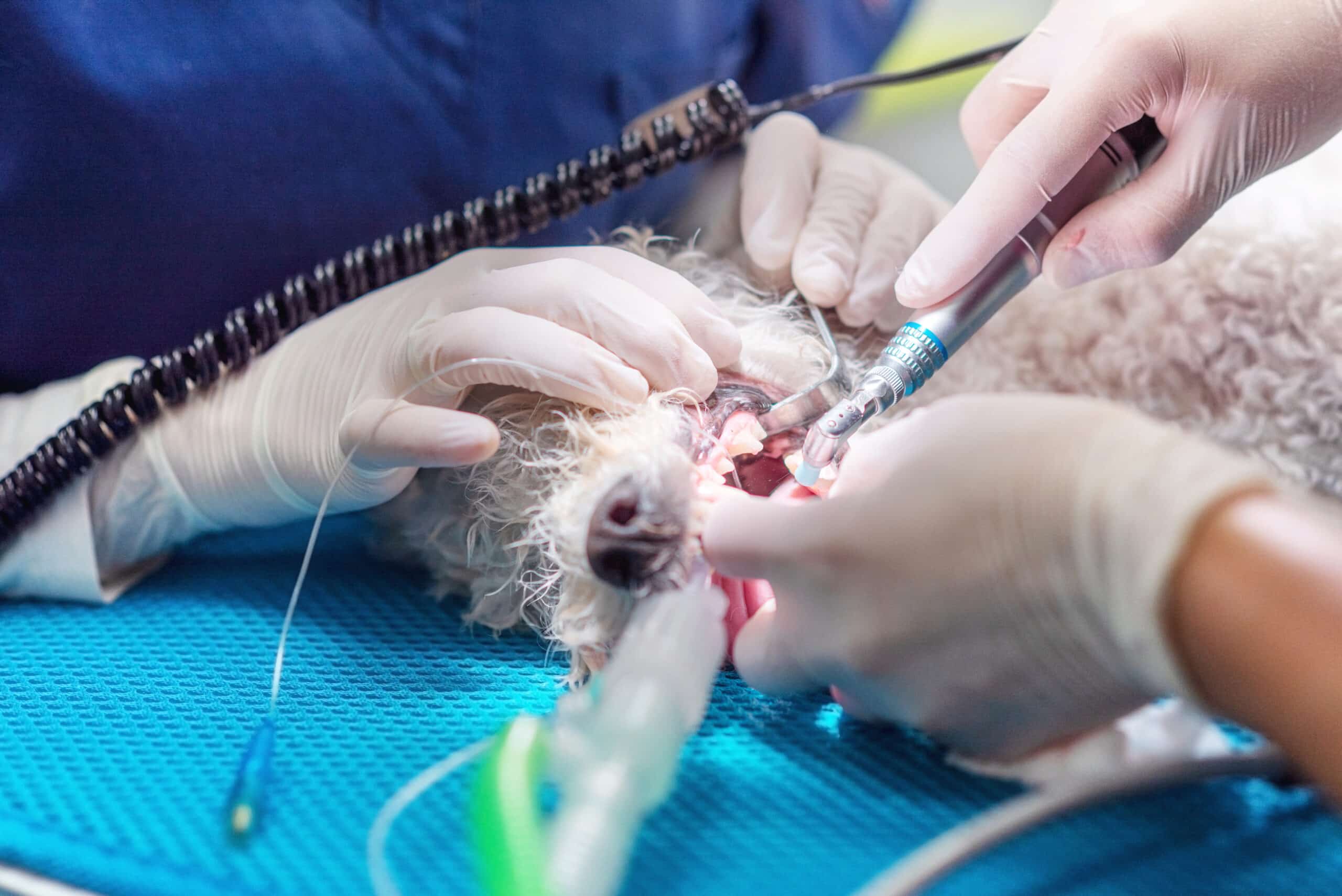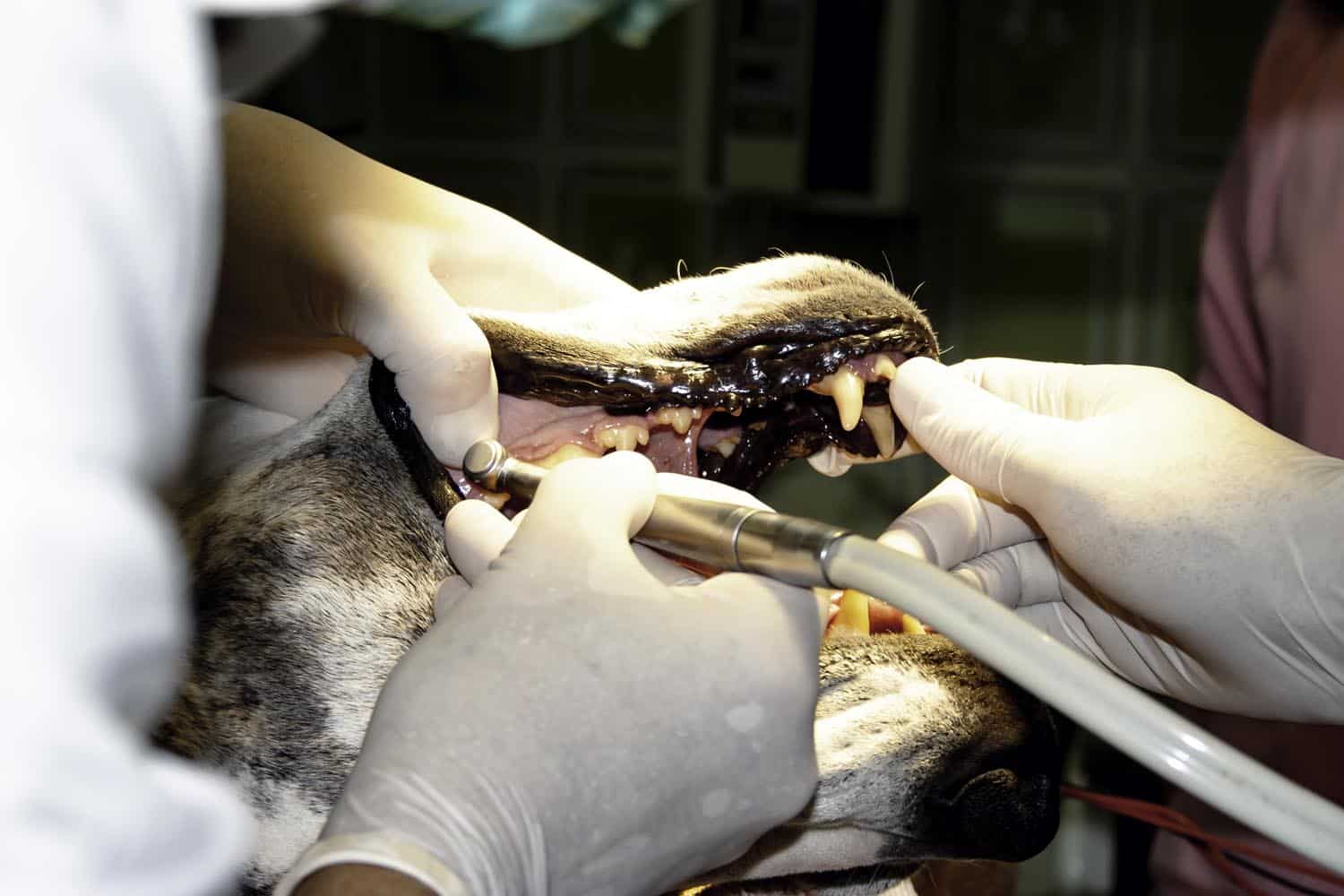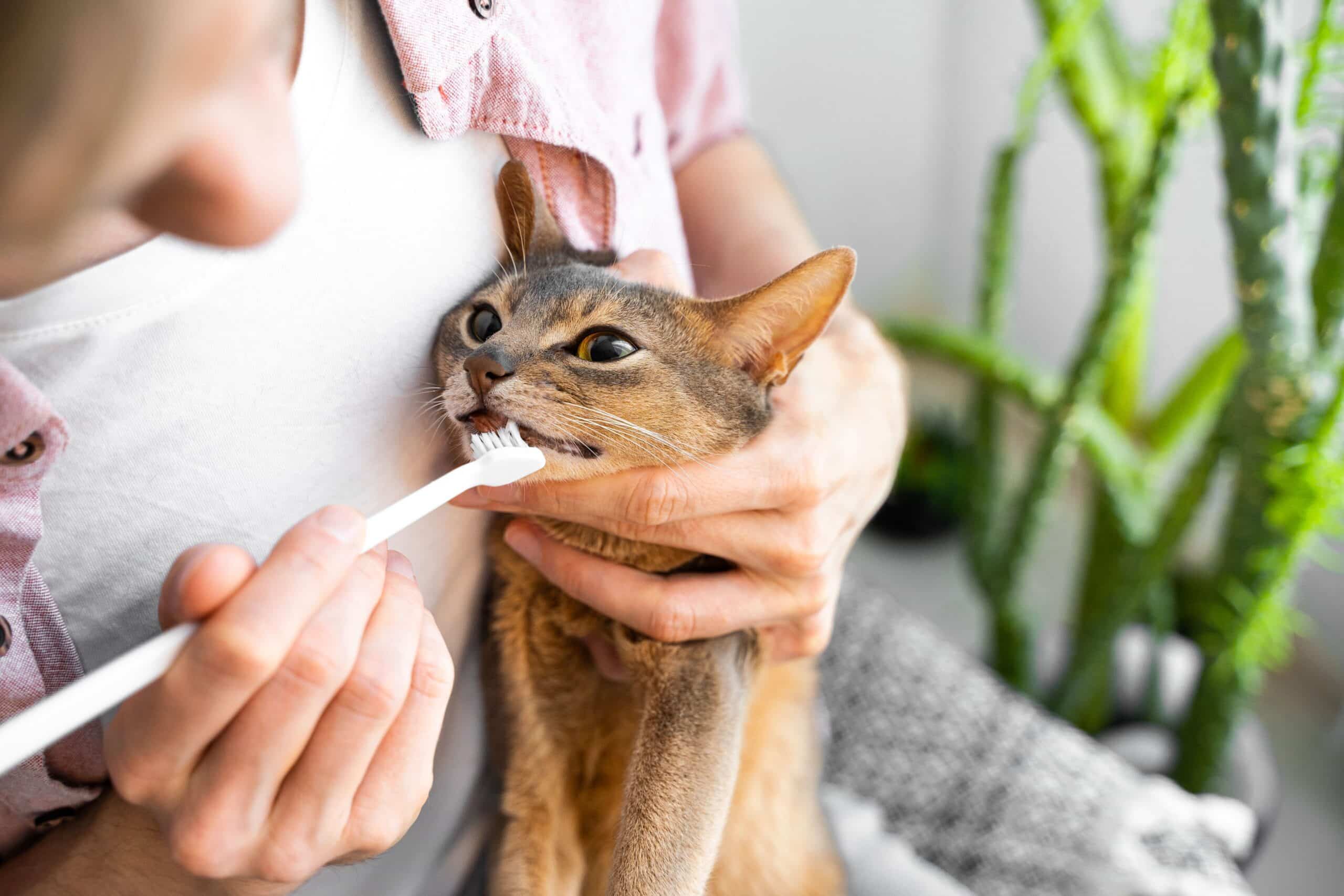Pet Dental Care in Minneapolis, MN | Pet Doctors Animal Clinic
Did you know your pet’s dental health directly impacts their overall health? Just like in humans, regular dental care is essential for preventing serious health problems caused by the buildup of plaque and tartar.
At Pet Doctors Animal Clinic in Minneapolis, we offer advanced veterinary dentistry to safeguard your pet’s oral health. Our veterinary dentistry services are designed to provide comprehensive care for your dog or cat, to keep your furry friend’s smile healthy for life.
The Importance of Pet Dental Care

The Sneaky Progression of Pet Dental Disease
Understanding the progression of dental disease can help you recognize the importance of early intervention. Veterinary dentistry classifies dental disease into four stages:
Grade 1: Gingivitis
At this early stage, the gums are inflamed and swollen, and some plaque is present on the teeth. This stage is reversible with proper care, including professional cleaning and consistent home care.
Grade 2: Early Periodontitis
The entire gum is now inflamed and swollen, and your pet may start showing signs of discomfort or pain. At this stage, bad breath becomes noticeable. Professional treatment, combined with diligent home care, can prevent the condition from becoming irreversible.
Grade 3: Moderate Periodontitis
The gums are severely inflamed, and they may bleed easily in this stage. The infection has begun to destroy the structures supporting the teeth, leading to the loosening of teeth. Your pet may have difficulty eating and could exhibit changes in behavior due to pain. Immediate professional intervention is necessary to prevent further damage.
Grade 4: Advanced Periodontitis
The most severe stage of dental disease. The gums, teeth, and supporting bone structures are being destroyed by chronic bacterial infection. The bacteria may spread throughout the body, potentially causing damage to vital organs. At this stage, tooth extraction is often necessary, and the condition can really impact your pet’s quality of life.
Our Veterinary Dentistry Services
At Pet Doctors Animal Clinic, we offer a full range of dental services tailored to your pet’s specific needs. Our goal is to prevent dental disease from developing and to treat it effectively if it does occur. Here’s what you can expect when you bring your pet in for dental care:

Comprehensive Dental Exams
Every dental visit begins with a thorough examination of your pet’s mouth. Our veterinarians will look for signs of dental disease, such as tartar buildup, inflamed gums, and loose or broken teeth.
Every dental visit begins with a thorough examination of your pet’s mouth. Our veterinarians will look for signs of dental disease, such as tartar buildup, inflamed gums, and loose or broken teeth.
- Visual inspection of the teeth and gums
- Assessment of breath odor
- Checking for loose or missing teeth
- Evaluating the bite and jaw alignment
- Detecting oral masses or abnormalities
- Pain assessment
Every dental visit begins with a thorough examination of your pet’s mouth. Our veterinarians will look for signs of dental disease, such as tartar buildup, inflamed gums, and loose or broken teeth.
- Identify hidden dental issues
- Evaluate tooth root health
- Assess bone density and structure
- Plan for extractions or other procedures
- Monitor ongoing dental health
Comprehensive dental exams, combined with the use of dental x-rays, we examine your furry friend’s teeth and gums thoroughly. This allows us to diagnose issues accurately and create a personalized treatment plan that addresses all aspects of your pet’s dental care, ensuring their mouth is healthy and pain-free for years to come.
Professional Dental Cleaning
If we find dental problems, we will recommend a professional dental cleaning under anesthesia to remove plaque and tartar from your pet’s teeth. Anesthesia is necessary because it allows us to thoroughly clean below the gumline, where periodontal disease often begins. It also enables us to polish the teeth, which smooths the surfaces and makes it harder for plaque to accumulate in the future.
Procedure Details (Under Anesthesia)
- Pre-anesthetic evaluation
- Administration of anesthesia
- Scaling and polishing
- Thorough examination during cleaning
- Post-cleaning fluoride treatment
- Waking up and recovery
Importance of Cleaning Below the Gumline
- Preventing periodontal disease
- Eliminating bacteria at the source
- Reducing inflammation and promoting healing
- Preventing tooth loss
- Maintaining long-term oral health
Dental X-Rays
In many cases, we recommend dental x-rays as part of the cleaning procedure. Dental x-rays give us a clear picture of what’s happening beneath the gumline. Through this, we can easily detect hidden problems such as tooth root abscesses, fractured teeth, impacted teeth, retained roots, bone loss, cysts and tumors. Early detection means less pain and improved well-being of your furry friend.
At Pet Doctors Animal Clinic, we use state-of-the-art dental x-ray technology to provide a complete assessment of your pet’s teeth and the structures supporting them.
Purpose and Benefits of Dental X-Rays
- Providing a complete picture of oral health
- Enhancing diagnostic accuracy
- Guiding treatment decisions
- Monitoring progress and healing
- Preventing future problems
- Ensuring thorough care
Tooth Extractions
Advanced dental disease may require tooth extraction for your pets. Our veterinarians perform extractions with the utmost care, using advanced techniques to minimize discomfort and promote healing. We will provide you with post-care detailed instructions on how to care for your pet as they recover, including pain management and dietary recommendations.
When the tooth is beyond repair, tooth extraction is your last resort. Several common scenarios may require this procedure:
- Severe periodontal disease
- Tooth fractures
- Tooth root abscesses
- Retained baby teeth (deciduous teeth)
- Severe tooth decay
- Malocclusion and crowding
- Oral tumors or cysts
Tooth extractions, while necessary in many cases, can be uncomfortable for your pet. At Pet Doctors Animal Clinic, we prioritize pain management and recovery to ensure that the process is as smooth and your pet experiences as little discomfort as possible and heals quickly after the procedure.
Pre-Anesthetic Blood Work
Anesthesia can be worrisome. Because dental procedures require general anesthesia, we recommend pre-anesthetic blood work to ensure your pet’s safety. This helps to detect potential health issues and choose the safest anesthesia protocol for your pet. At Pet Doctors Animal Clinic, we prioritize your furry friend’s safety especially when they undergo procedures that require general anesthesia, such as dental cleanings, tooth extractions, or surgeries.
Anesthesia affects the entire body, but it places particular stress on key organs such as the liver, kidneys, and heart. These organs are responsible for metabolizing and eliminating anesthetic drugs from the body, so it’s essential that they are functioning properly before anesthesia is administered.
Detecting Hidden Health Conditions
Pre-anesthetic blood work can uncover hidden health conditions that may not be apparent during a physical exam. Pets, especially cats and dogs, are often adept at hiding signs of illness, and some conditions may not show symptoms until they are quite advanced. Pre-anesthetic blood work acts as a screening tool to detect health issues such as anemia, infections, diabetes, and blood clotting disorders before they pose a threat during anesthesia.
The results of pre-anesthetic blood work will help us to create a customized anesthetic protocol based on your pet’s specific health status.
This thorough approach not only safeguards your pet’s health during the procedure but also contributes to a quicker and more comfortable recovery afterward.
Post-Procedure Care
After the dental procedure, our team will provide you with clear post-operative instructions to ensure a smooth recovery for your pet. These instructions include feeding guidelines, activity restrictions, oral hygiene and care, medication administration, and monitoring and protecting the surgical site. Our vets at Pet Doctors Animal Clinic are readily available to address any questions or concerns you may have during your pet’s recovery.
Pain management is essential in post-procedure care. Here’s how our veterinary dentist helps manage your pet’s pain and what you should monitor at home:
- Effective pain relief
- Monitoring for pain and discomfort
- Temperature monitoring
- Behavioral changes
- Follow-up appointments
- Long-term pain management

Regular Brushing
Brushing your pet’s teeth is one of the most effective ways to prevent dental disease. It may be challenging at first. Start brushing your pet’s teeth with the right tool. Use a soft-bristled toothbrush and a pet-safe toothpaste. Introduce it slowly. Be consistent and aim for 2-3 times a week until your pet is used to everyday brushing. Your furry friend will eventually enjoy this routine.
You can find a variety of pet-safe toothbrushes and toothpaste options in our online store, making it easy to get the supplies you need for your pet’s dental care routine.
Dental Chews and Toys
Dental chews and toys are a great addition to your pet’s oral care routine. These fun treats work as dental helpers and are designed to help clean your pet’s teeth as they chew, scrubbing away plaque and tartar and promoting healthier gums. Make sure to choose Veterinary Oral Health Council (VOHC)-approved dental chews and toys. Always supervise your pets during chewing sessions to prevent accidents. Bones and antlers are hard chews so try to avoid them.
Dental Diets and Treats
Certain diets and treats can enhance your pet’s dental health. These products work by reducing plaque buildup, encouraging chewing to scrub teeth, and helping to clean the teeth. Dental-specific diets often have larger kibble sizes and texture to help clean the teeth as your pet chews. On the other hand, dental treats can be a tasty way to help keep your pet’s teeth clean at the same time freshening their breaths. Just make sure these treats are low in calories to avoid unwanted weight gain.
Regular Veterinary Check-Ups
Even with diligent at-home care, it’s important to have your pet’s teeth checked regularly by a veterinarian. Routine dental exams allow us to monitor your pet’s oral health and catch any issues before they become serious. Remove tartar and plaque through professional cleanings.
Recognizing Signs of Dental Problems
Recognizing signs of dental disease can help you take immediate action if your pet’s oral health starts to decline. Some common signs that your pet may be experiencing dental issues include bad breath, red or swollen gums, difficulty eating, tartar buildup, excessive drooling, and behavioral changes. Contact us right away if you see any of these symptoms.
Don't Let Dental Disease Steal Your Pet's Joy | Call Us Today!
Your pet’s oral health is vital to their overall well-being, and our team at Pet Doctors Animal Clinic is here to help. If you have concerns about your pet’s dental health or would like to schedule a dental cleaning, please contact us at (612) 607-0044. Our goal is to provide specialty dental care to ensure your pet’s teeth and gums stay healthy and pain-free.
Frequently Asked Questions For Pet Dentistry
This is just placeholder text. Don’t be alarmed, this is just here to fill up space since your finalized copy isn’t ready yet. Once we have your content finalized, we’ll replace this placeholder text with your real content.
Why is general anesthesia necessary for a dental procedure? My groomer cleans my pet’s teeth without it.
Anesthesia-free dental cleanings are not truly effective because 60% of the tooth lies below the gum line. Proper cleaning, especially below the gum line, cannot be achieved in an awake pet. General anesthesia allows us to thoroughly clean your pet’s teeth, including areas that would otherwise be unreachable.
How often should I bring my pet in for a dental cleaning?
Most pets benefit from an annual dental cleaning. However, some pets, especially those prone to dental issues, may require more frequent cleanings. Your veterinarian will recommend a schedule based on your pet’s specific needs and health status.
What should I look for to identify dental disease in my pets?
Common signs of dental disease include bad breath, trouble eating, red gums, and tartar buildup on the teeth. Pets may also show signs of discomfort, such as pawing at the mouth or avoiding hard food or toys. If you notice any of these symptoms, it’s important to schedule a dental exam.
Is dental disease painful for my pet?
Yes, dental disease can be very painful. Pets may experience significant discomfort while eating or playing with toys. In advanced cases, the pain can become chronic, leading to changes in behavior and a decreased quality of life. Prompt treatment is essential to alleviate pain and prevent further complications.
How can I maintain my pet’s dental health at home?
Regular home care is crucial for maintaining your pet’s dental health between professional cleanings. Brushing your pet’s teeth daily with pet-safe toothpaste is the best way to prevent plaque buildup. Additionally, dental chews, water additives, and specially formulated diets can help reduce plaque and tartar. Our veterinarians can recommend the best products and techniques for your pet.